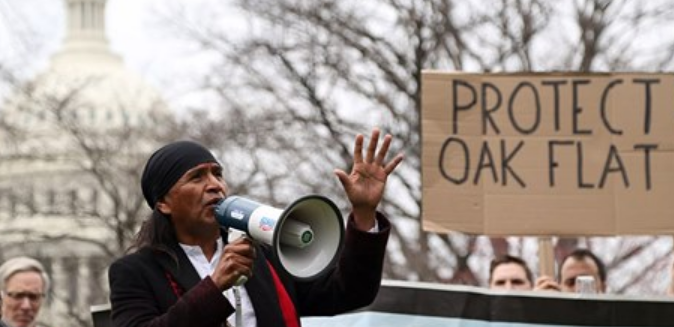
- Details
- By Kaili Berg
Apache Stronghold, a Native American advocacy group, has made a final legal plea to the U.S. Supreme Court to block the development of one of the world’s largest copper mines on sacred Arizona land.
The group, representing the San Carlos Apache tribe, has long opposed the efforts of mining giants Rio Tinto and BHP to gain access to Oak Flat, known to the Apache as Chi’chil Biłdagoteel, arguing that the project would destroy a key religious site.
Chi’chil Biłdagoteel, or Oak Flat, is a federally owned piece of land located in Arizona. It holds deep spiritual significance for the San Carlos Apache people and other tribes for time immemorial.
However, Oak Flat is also home to a vast copper reserve, estimated to contain over 40 billion pounds of the metal. Copper is a crucial material for the production of electric vehicles and electronics, making the land a prime target for resource extraction in the global shift toward renewable energy.
If a mine is built, the site would be transformed into a crater two miles wide and 1,100 feet deep, devastating the land’s sacred and ecological value.
The conflict over Oak Flat began in 2014 when Congress, under President Barack Obama, approved a land swap deal that would allow the federal government to transfer Oak Flat to Rio Tinto and BHP in exchange for other parcels of land.
This deal quickly sparked backlash from Apache Stronghold, which argued that the mining project would desecrate a sacred Apache worship site.
By 2015, the group had launched legal challenges and organized protests, raising awareness about the cultural and religious importance of Oak Flat. The case gained national attention as it became a flashpoint for the broader debate over Indigenous land rights and environmental justice.
In 2021, when President Joe Biden took office, he temporarily froze the land swap. However, the Biden Administration’s Department of Justice later argued in court that the federal government has the right to dispose of its land for national purposes, even if it interferes with religious practices.
The situation took a significant turn in March 2024 when the 9th U.S. Circuit Court of Appeals ruled in favor of the mining companies, allowing the land swap to proceed. Apache Stronghold vowed to continue their fights, taking the case to the U.S. Supreme Court.
In September 2024, Apache Stronghold delivered their appeal to the Supreme Court, following a months-long caravan from their Arizona reservation to Washington, D.C. The group then held a ceremony of prayer and dance on the steps of the Supreme Court.
For Apache Stronghold’s appeal to move forward, at least four Supreme Court justices must agree to hear the case. If the court accepts, oral arguments could begin as early as the next term, which starts in October 2024, with a decision potentially being issued by June 2025.
More Stories Like This
Michigan Tribes Tell Supreme Court: Don’t Bail Out EnbridgeAlaskans Raise More Than $1 Million For Communities Devastated by Typhoon Halong
A True American Tale: Indigenous Rights vs. Corporate Greed
In photos: Residents of Western Alaska Share Storm Damage of Ex-Typhoon Halong
Where the Buffalo Roam: Tribes Lead Bison Return for Food Sovereignty
Help us tell the stories that could save Native languages and food traditions
At a critical moment for Indian Country, Native News Online is embarking on our most ambitious reporting project yet: "Cultivating Culture," a three-year investigation into two forces shaping Native community survival—food sovereignty and language revitalization.
The devastating impact of COVID-19 accelerated the loss of Native elders and with them, irreplaceable cultural knowledge. Yet across tribal communities, innovative leaders are fighting back, reclaiming traditional food systems and breathing new life into Native languages. These aren't just cultural preservation efforts—they're powerful pathways to community health, healing, and resilience.
Our dedicated reporting team will spend three years documenting these stories through on-the-ground reporting in 18 tribal communities, producing over 200 in-depth stories, 18 podcast episodes, and multimedia content that amplifies Indigenous voices. We'll show policymakers, funders, and allies how cultural restoration directly impacts physical and mental wellness while celebrating successful models of sovereignty and self-determination.
This isn't corporate media parachuting into Indian Country for a quick story. This is sustained, relationship-based journalism by Native reporters who understand these communities. It's "Warrior Journalism"—fearless reporting that serves the 5.5 million readers who depend on us for news that mainstream media often ignores.
We need your help right now. While we've secured partial funding, we're still $450,000 short of our three-year budget. Our immediate goal is $25,000 this month to keep this critical work moving forward—funding reporter salaries, travel to remote communities, photography, and the deep reporting these stories deserve.
Every dollar directly supports Indigenous journalists telling Indigenous stories. Whether it's $5 or $50, your contribution ensures these vital narratives of resilience, innovation, and hope don't disappear into silence.
 The stakes couldn't be higher. Native languages are being lost at an alarming rate. Food insecurity plagues many tribal communities. But solutions are emerging, and these stories need to be told.
The stakes couldn't be higher. Native languages are being lost at an alarming rate. Food insecurity plagues many tribal communities. But solutions are emerging, and these stories need to be told.
Support independent Native journalism. Fund the stories that matter.
Levi Rickert (Potawatomi), Editor & Publisher

